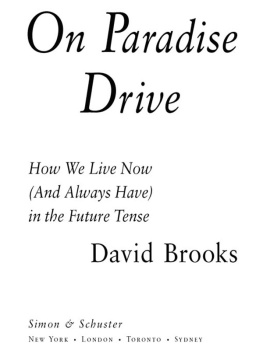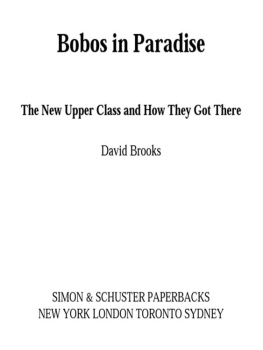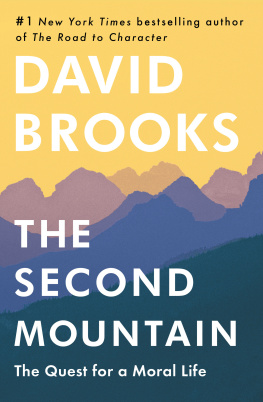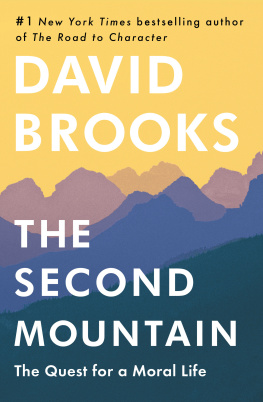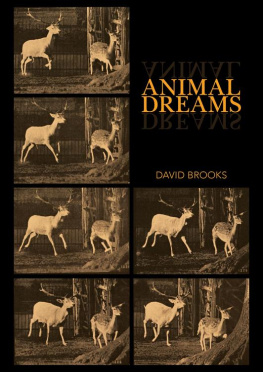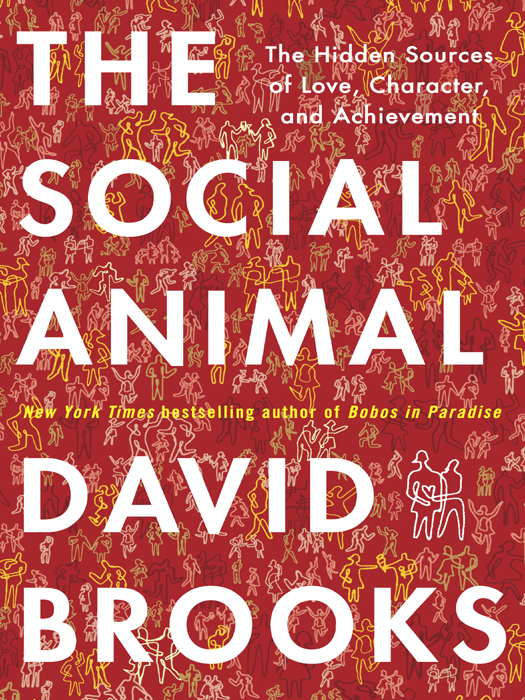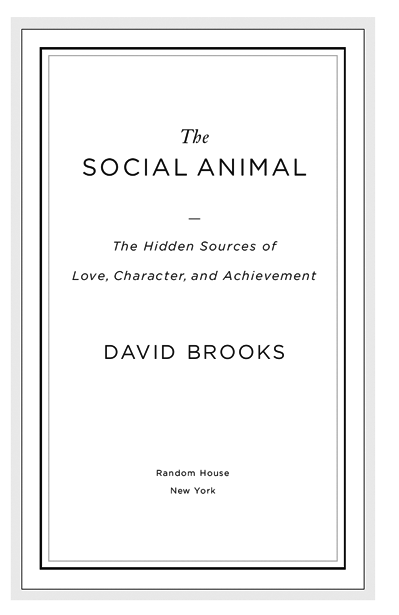Also by David Brooks
ON PARADISE DRIVE:
HOW WE LIVE NOW (AND ALWAYS HAVE)
IN THE FUTURE TENSE
BOBOS IN PARADISE:
THE NEW UPPER CLASS AND
HOW THEY GOT THERE
Copyright 2011 by David Brooks
All rights reserved.
Published in the United States by Random House,
an imprint of The Random House Publishing Group,
a division of Random House, Inc., New York.
R ANDOM H OUSE and colophon are registered trademarks of Random House, Inc.
LIBRARY OF CONGRESS CATALOGING-IN-PUBLICATION DATA
Brooks, David
The social animal: the hidden sources of love, character, and achievement / David Brooks.
p. cm.
eISBN: 978-0-679-60393-1
1. Man-woman relationshipsUnited States. 2. Social mobilityUnited States. 3. Social statusUnited States. 4. Elite (Social sciences)United States. 5. Character. I. Title.
HQ801.B76 2011 305.5130973dc22 2010045785
www.atrandom.com
v3.1
Contents
INTRODUCTION
T HIS IS THE HAPPIEST STORY YOUVE EVER READ. ITS ABOUT two people who led wonderfully fulfilling lives. They had engrossing careers, earned the respect of their friends, and made important contributions to their neighborhood, their country, and their world.
And the odd thing was, they werent born geniuses. They did okay on the SAT and IQ tests and that sort of thing, but they had no extraordinary physical or mental gifts. They were fine-looking, but they werent beautiful. They played tennis and hiked, but even in high school they werent star athletes, and nobody would have picked them out at that young age and said they were destined for greatness in any sphere. Yet they achieved this success, and everyone who met them sensed that they lived blessed lives.
How did they do it? They possessed what economists call noncognitive skills, which is the catchall category for hidden qualities that cant be easily counted or measured, but which in real life lead to happiness and fulfillment.
First, they had good character. They were energetic, honest, and dependable. They were persistent after setbacks and acknowledged their mistakes. They possessed enough confidence to take risks and enough integrity to live up to their commitments. They tried to recognize their weaknesses, atone for their sins, and control their worst impulses.
Just as important, they had street smarts. They knew how to read people, situations, and ideas. You could put them in front of a crowd, or bury them with a bunch of reports, and they could develop an intuitive feel for the landscape before themwhat could go together and what would never go together, what course would be fruitful and what would never be fruitful. The skills a master seaman has to navigate the oceans, they had to navigate the world.
Over the centuries, zillions of books have been written about how to succeed. But these tales are usually told on the surface level of life. They describe the colleges people get into, the professional skills they acquire, the conscious decisions they make, and the tips and techniques they adopt to build connections and get ahead. These books often focus on an outer definition of success, having to do with IQ, wealth, prestige, and worldly accomplishments.
This story is told one level down. This success story emphasizes the role of the inner mindthe unconscious realm of emotions, intuitions, biases, longings, genetic predispositions, character traits, and social norms. This is the realm where character is formed and street smarts grow.
We are living in the middle of a revolution in consciousness. Over the past few years, geneticists, neuroscientists, psychologists, sociologists, economists, anthropologists, and others have made great strides in understanding the building blocks of human flourishing. And a core finding of their work is that we are not primarily the products of our conscious thinking. We are primarily the products of thinking that happens below the level of awareness.
The unconscious parts of the mind are not primitive vestiges that need to be conquered in order to make wise decisions. They are not dark caverns of repressed sexual urges. Instead, the unconscious parts of the mind are most of the mindwhere most of the decisions and many of the most impressive acts of thinking take place. These submerged processes are the seedbeds of accomplishment.
In his book, Strangers to Ourselves, Timothy D. Wilson of the University of Virginia writes that the human mind can take in 11 million pieces of information at any given moment. The most generous estimate is that people can be consciously aware of forty of these. Some researchers, Wilson notes, have gone so far as to suggest that the unconscious mind does virtually all the work and that conscious will may be an illusion. The conscious mind merely confabulates stories that try to make sense of what the unconscious mind is doing of its own accord.
Wilson and most of the researchers Ill be talking about in this book do not go so far. But they do believe that mental processes that are inaccessible to consciousness organize our thinking, shape our judgments, form our characters, and provide us with the skills we need in order to thrive. John Bargh of Yale argues that just as Galileo removed the earth from its privileged position at the center of the universe, so this intellectual revolution removes the conscious mind from its privileged place at the center of human behavior. This story removes it from the center of everyday life. It points to a deeper way of flourishing and a different definition of success.
The Empire of Emotion
This inner realm is illuminated by science, but it is not a dry, mechanistic place. It is an emotional and an enchanted place. If the study of the conscious mind highlights the importance of reason and analysis, study of the unconscious mind highlights the importance of passions and perception. If the outer mind highlights the power of the individual, the inner mind highlights the power of relationships and the invisible bonds between people. If the outer mind hungers for status, money, and applause, the inner mind hungers for harmony and connectionthose moments when self-consciousness fades away and a person is lost in a challenge, a cause, the love of another or the love of God.
If the conscious mind is like a general atop a platform, who sees the world from a distance and analyzes things linearly and linguistically, the unconscious mind is like a million little scouts. The scouts careen across the landscape, sending back a constant flow of signals and generating instant responses. They maintain no distance from the environment around them, but are immersed in it. They scurry about, interpenetrating other minds, landscapes, and ideas.
These scouts coat things with emotional significance. They come across an old friend and send back a surge of affection. They descend into a dark cave and send back a surge of fear. Contact with a beautiful landscape produces a feeling of sublime elevation. Contact with a brilliant insight produces delight, while contact with unfairness produces righteous anger. Each perception has its own flavor, texture, and force, and reactions loop around the mind in a stream of sensations, impulses, judgments, and desires.
These signals dont control our lives, but they shape our interpretation of the world and they guide us, like a spiritual GPS, as we chart our courses. If the general thinks in data and speaks in prose, the scouts crystallize with emotion, and their work is best expressed in stories, poetry, music, image, prayer, and myth.


